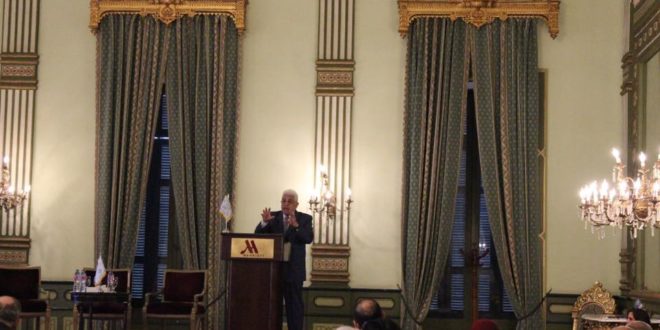Dr. Badrawi delivers an important speech at an international symposium on “Open Government”
At the invitation of the National Council for Human Rights in Egypt, Prof. Dr. Hossam Badrawi delivered an important speech today during an international introductory symposium on “Open Governance” organized by the Council in cooperation with the European Commission for Democracy through Law (Venice Commission).
The symposium will be held for two days in Cairo, in the presence of a group of international and Egyptian personalities, including Mr. Mohamed Fayek, President of the National Council for Human Rights, Mr. Dimitrov, Vice-President of the Venice Commission – a judge of the Bulgarian Constitutional Court – and Dr. Terry Verdel, Dean of Senghor University in Alexandria, Major General Dr. Hisham Zaalouk, Director of the National Anti-Corruption Academy and First Undersecretary of the Administrative Control Authority, Dr. Rasha Mustafa, Head of the Decision Support Center at the Information and Decision Support Center at the Presidency of the Council of Ministers, the number of foreign delegations from several countries, a number of media professionals, journalists, representatives of civil society organizations and public figures .
The European Commission for Democracy through Law, which is called the “Venice Commission” is an advisory organ of the Council of Europe on constitutional issues, and it played an effective role in adopting constitutions conforming to the criteria of the European constitutional heritage, as it was initially a tool for expedited constitutional engineering in the context of the democratic transition, as it was known It gradually developed into an internationally recognized independent think tank.
The commission contributes to the radiance of the constitutional heritage built on the ground rules, while continuing to ensure the constitutional reforms of states. It also plays a role in managing and preventing conflicts by setting standards and providing advice in the field of the constitution, and among its activities are constitutional assistance, elections and referendums, and cooperation with constitutional courts.
During his speech, Dr. Hossam Badrawi pointed to the change in the traditional form of political parties with the changes of the times and technological developments and others, which have changed the concept of democracy and the role of political parties, stressing that the world is entering a new stage that requires searching for new mechanisms to implement democracy that leads to good governance and transparency.
He noted the importance of enhancing civil society participation and enhancing the role of citizens in civil society, which is reflected in the development of society as a whole, as the government’s efforts alone will not meet what is required to achieve a breakthrough in sustainable development.
After his speech, the discussion was opened, where the audience interacted with Dr. Badrawi and asked him questions about his lecture, praising his political history and vision that he presented in a positive interactive atmosphere of discussion.
 Dr. Hossam Badrawi Official Website
Dr. Hossam Badrawi Official Website


